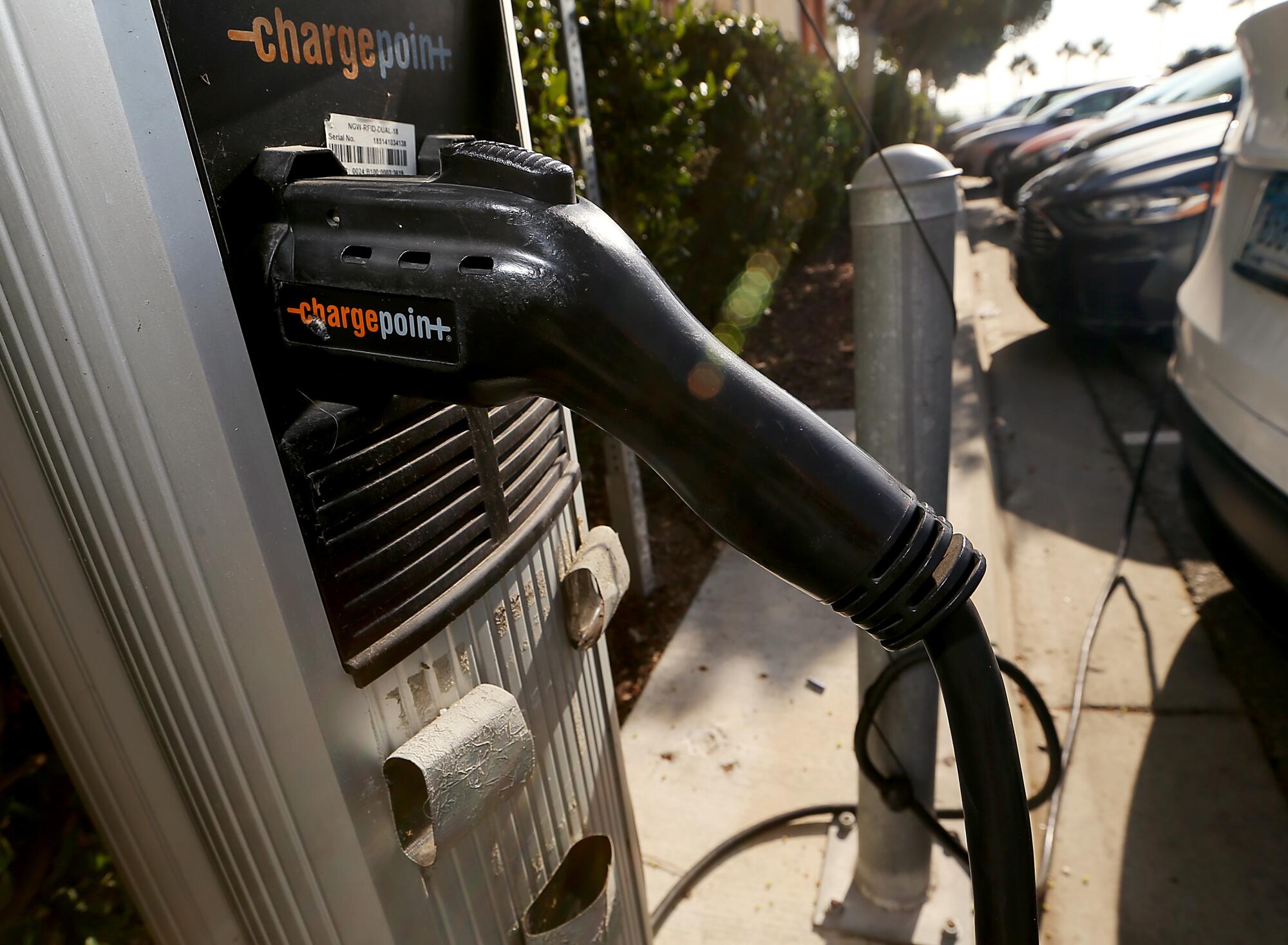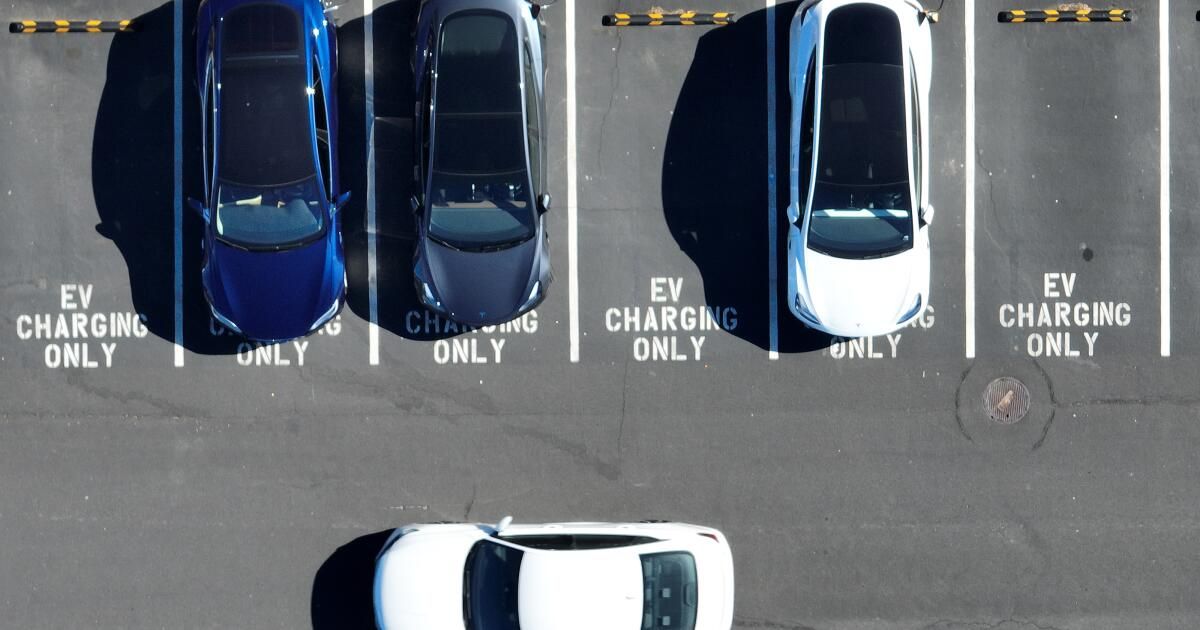California drivers already navigate some of the worst sidewalks in the country, but poor conditions on the state's roads and highways could get much worse in the coming years as electric cars take over and gasoline cars disappear, according to state analysts.
That's because money for road repair and maintenance depends on state taxes on motor fuel, and those revenues are expected to fall. Electric vehicles do not use gasoline, so EV drivers do not pay gas tax.
Aggressive and impactful reporting on climate change, the environment, health and science.
A new report from the Legislative Analyst's Office warns that lost state fuel tax revenue could have dire consequences for highway maintenance. Taxes on gasoline and diesel now amount to about $14.2 billion a year. More than $4 billion annually could disappear between now and 2035, when the state's ban on the sale of new fossil fuel cars takes full effect.
The news comes as the state is struggling with a $37.9 billion budget shortfall that has forced cuts to climate programs and other services. The potential solutions outlined in the report are likely to prove unpopular: raising taxes, raising fees or cutting spending on road repair, maintenance and construction.
California has positioned itself as a world leader in the fight against climate change. Aggressively transitioning to 100% zero-emission cars and trucks by 2035 is key to the plan. Transportation accounts for about 40% of California's greenhouse gases, about three-quarters of that coming from passenger cars and trucks.
Stephen Finnegan, government affairs manager for the Automobile Club of Southern California, notes that “roads and transportation are fundamental to life in California, critical to our economy, our quality of life and our safety.” A fundamental transformation in a culture that has long depended on fossil fuel transportation will not be without new costs.
But cutting spending on highways is unlikely to please California drivers, who traverse some of the worst roads in the country. A 2022 state-by-state ranking of highway health by the American Society of Civil Engineers places California in second-to-last place, tied with six other states with a grade of D. Only one state's grade was worse: Mississippi , which earned a D-minus.

A ChargePoint public electric vehicle charger in Long Beach. A new report warns that the transition to electric vehicles will result in lost fuel tax revenue and funding for road maintenance.
(Luis Sinco/Los Angeles Times)
“There are a lot of infrastructure projects at the end of their useful life,” said Andreas Groehn of the private research group Berkeley. “Replacing them will become increasingly expensive.”
The traditional way to make up for highway funding shortfalls is to increase taxes on motor fuels.
The gas tax is currently 57.9 cents per gallon, one of the highest in the country, and under state law it increases each year with inflation. Gas tax increases are always a tough sell, and raising them to make up for lost revenue due to alternatives to electric vehicles could be even harder since gas users would be the ones paying.
Still, the maintenance of 52,000 miles of state highways and 333,000 miles of local roads must be paid for somehow.
Another option is to extend highway financing costs to electric vehicles. In California, electric vehicle owners with cars from the 2020 model year or later pay a special registration fee of $108 per year per vehicle. This is expected to add $80 million to the highway funding budget, according to the California Department of Transportation. Even as EV market share grows, a fee at that level will not be enough to cover the funding gap, the report said.
More than 30 states have implemented EV registration fees, most between $100 and $200. However, raising electric vehicle rates much further risks alienating some buyers who are considering trading in their fossil fuel cars and trucks for cleaner alternatives.
Annual registration fees, which are tied to a vehicle's market value, could also be raised, but such a move would almost certainly spark a political battle.
The most provocative idea in the analyst's office report is an on-road fee, based on the total miles traveled by the vehicle. The State has been testing a system of this type for several years. It would use GPS satellite information to track a vehicle's mileage and set rates accordingly.
Supporters see road fees as a modern, technological solution to an increasingly antiquated gas tax, a 100-year-old tax originally set at 2 cents per gallon in 1923.
“There is information and data available to help design a more optimal system than what currently exists,” said Kevin Christensen, Groehn's partner at Berkeley Research Group. Most options to fill the gap amount to adjustments to the system, but solutions “need to be more holistic and thoughtful,” he said.
A widespread shift toward road pricing presents complications, such as how to calculate trips on rural private roads, and privacy concerns among those who don't want the government to track their movements (even though Google, Apple, and other tech companies now do so). ).
The Auto Club's Finnegan is vice president of a state committee studying the road fee idea. Gas taxes are well understood by the public and easy to collect, he said. It would be difficult to move to a radically different system of highway financing. But “the question is finding the best way forward, and that is what is being worked on right now.”
The analyst's office recommends that the Legislature “continue to monitor” the looming highway funding shortfall and “begin developing a long-term plan on how to address future revenue declines.”
Neither the Assembly nor the Senate have plans to directly address the issue in the next legislative session, although the office of Senate Transportation Committee Chair Lena González (D-Long Beach) said an assessment of transportation needs The California Transportation Commission's 10-year term, scheduled for the end of the year, will lay the groundwork for focused deliberation.









